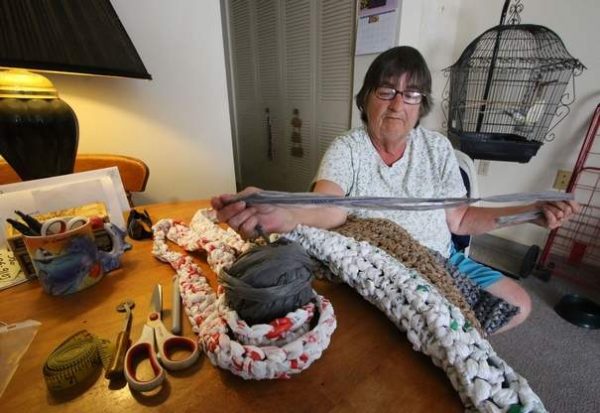By Ariell Marsh

Virginia Wingate discovered the best form of therapy after her husband’s death from a stroke just over a year ago.
The 68-year-old widow worked through her grief by turning a longtime hobby into a ministry. She now crochets mats that are made from plastic grocery bags for homeless men and women on the streets of Daytona Beach. She’s made 30 of the 6-foot-long lightweight, waterproof mats so far.
“Crocheting has become an important part of my life since my husband’s death because it keeps me busy and happy knowing that I’m helping someone else,” says Wingate. “It’s therapy for me because it helps me mentally so that I don’t have a breakdown.”
Wingate has been crocheting since she was 15. She became interested in the art when she took a visit to her grandmother’s house and saw some of the doilies she had lying around.
“I saw the most beautiful doilies that had the most gorgeous waves,” says Wingate. “Nobody in my family knew how to crochet, but I wanted to learn so badly.”
Wingate taught herself how to create crocheted patterns from a learn-how-to book. Soon after, she learned more about the art from four crocheters whom she knew.
“I’m just a country girl who loves to create her own things,” says Wingate.
Before her husband died, Wingate mostly crocheted things like dresses, doilies, and blankets.
In January 2015, she started making the plastic bag mats. She turned to her church, First Christian Church Daytona (Disciples of Christ), for a worthwhile cause to occupy her after husband’s death. Billie Lynch, chairwoman of the congregation’s outreach committee, had heard about the plastic bag mats. Knowing Wingate was an avid crocheter, Lynch asked her if she would be interested in making them for homeless people. With eagerness, Wingate got started on making these unique works of art. She took a pattern that had been used by others and made it her own by creating a different design and a “strap” for the homeless to easily transport the rolled-up mat.
The sleeping mats are made of grocery store plastic bags cut into strips that are tied together to become “plarn” — plastic yarn. Wingate uses any plastic shopping bags, except the ones that are too big or too small, that she receives from shopping or from neighbors. The mats are usually about six feet long. Between 500 to 700 bags are needed to make each mat. They take about two weeks for Wingate to complete and are waterproof and bug-free.
According to Lynch, putting together those strips of plastic bags is a challenge because when you stack plastic it tends to slide, but she says that Wingate does an amazing job making them.
“Her work looks like it was done by a machine as opposed to handmade,” says Lynch.
Once Wingate is done making them, she takes them to First Christian Church Daytona and from there Pastor Dave Troxler takes them to Halifax Urban Ministries to be distributed to the homeless.
Lynch says she knows a few local churches make the mats as a group ministry, but that Wingate’s individual efforts are impressive.
“This is one talented woman who has found her way to serve God … quietly and unassumingly,” Lynch says.
Complete Article HERE!
